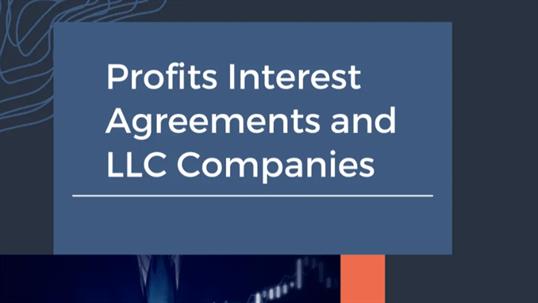What does the term “profits interest” mean?
Profits interest refers to an equity compensation mechanism which allows Limited Liability Companies (LLCs) to offer their employees a share of profits without having to allocate managerial or voting rights to them.
How can LLCs utilize Profits Interest Agreements?
Employees are more likely to remain motivated and productive when their future income is tied directly to the company’s profits and appreciation of assets. Utilizing profits interest agreements offers a neat solution for most startups who may not have a lot of capital to begin with- such companies can use these agreements to promise their employees a portion of their success when (and if!) they achieve it. Profits interest agreements are not typically used by companies that will be looking to raise capital in the future from third parties, but rather by startups where an LLC wants to provide incentives to key employees/partners.
What are the differences between granting profits interest and granting ownership?
Granting profits interests can take the form of a contractual agreement between the LLC and the grantee or can take the form of an actual ownership interest with certain restrictions around allocations and actual distributions (assuming the LLC is taxed as a pass-through entity). Whether a person is an owner in the LLC or not for the profits interest determines the rights to information, voting rights and other duties that may be owed to the grantee from the LLC under Texas state law.
Profits Interests Agreements in Action
By way of example, let's assume that ABC LLC is worth $ 10,000. John Doe is granted a 5 % profits interest in this company.
Scenario # 1:
ABC LLC is sold 3 months later for $10,000 or less.
In this scenario, John will get nothing. This is because the profits interest granted to him only entitles him to profits or appreciation in the value of the company. Thus, if the value of the company decreases or remains the same, John will get no monetary benefit whatsoever.
Scenario # 2:
ABC LLC is sold 6 months later for $20,000
In this scenario, John gets $500 (5% of the $10,000 profit)
As can be seen from the examples above, John only receives a benefit if the company makes a profit or appreciates in value. If the company goes into liquidation before that, he does not get a share of the sale proceeds.
Capital Interest
The main distinguishing factor between capital interest and profits interest is that the grantee of a capital interest has a stake in the company value AT THE POINT which the interest was granted, as well as a portion of the profit. Thus, capital interest holders benefit even if there has been no appreciation in company value.
Scenario # 3:
ABC LLC is worth $ 6,000. John Doe is granted a 10 % capital interest. The company is sold after a month for $6,000.
In this case, there has been no appreciation in value, but John still receives $600 (10% of $6000, the value of the partnership at the time the capital interest was granted).
Scenario # 4:
ABC LLC is worth $ 6,000. John Doe is granted a 10 % capital interest. The company is sold after a year for $12,000. In this case, John will receive $1200. (10% of total amount, as opposed to 10% of the profit in the scenario # 3)
Vested Profits Interest
Sometimes, profits interests can be vested. This basically means that the interest will accrue only upon the satisfaction of certain criteria, which can be based on time, performance, or any other goal)
Scenario # 5:
ABC LLC is valued at $1000. John Doe is granted 10% profits interest, with 2% vested monthly. If ABC company is sold after 3 months, he will get $60 (6 percent of 1000).
Scenario # 6:
ABC LLC is valued at $1000. John Doe is granted 10% profits interest, with 2% vested monthly. If ABC LLC is sold after 5 months, he will get $100 (10% of $1000)
Profits Interest Taxation
The grant of a profits interest has important tax related implications; barring limited exceptions contained in IRS Rev. Proc. 93-27 ,they are taxable only at payment, rather than at allotment. This makes sense because they are not worth anything at the time of being granted.
Profit interest agreements have proven to be extremely popular due to the tax advantages that accrue to its holders. The Internal Revenue Code contains an important provision with regards to profit interest units. S83(b) allows the receivers of restricted security to pay their taxes based on what is known as the “fair market value” (FMV) of the award at the time that it was granted. It is easy to see how this provision is favorable for taxpayers- at the time when profits interest units are issued, their fair marker value is usually $0. Since most LLCs require an 83(b) election to enjoy these tax benefits, it is imperative that both companies and profit interest holders ensure that they file appropriately, according to IRS issued guidelines, within 30 days of the issuance of profit interest.
Hiring a competent team of lawyers to draft specialist agreements such as these is bound to save all parties involved from unnecessary hassle in the future. Contact The South Texas Business Lawyers for all your business needs!
Disclaimer: This article is made available for educational purposes only, to give you general information and a general understanding of the law, not to provide specific legal advice. By using this article, you understand and acknowledge that no attorney-client relationship is formed between you and The South Texas Business Lawyers, nor should any such relationship be implied. This article should not be used as a substitute for competent legal advice from a licensed professional attorney in your state.
Discover the Secret to Solving Any Legal Challenge in Your Business- FREE Private Facebook Group
Don't let legal issues destroy your business - get the legal support you need to stay PROACTIVE in this Free Private Group, "As A Texas Business Attorney", Limited Slots Available.
Fill out your information here and we will get you in!

